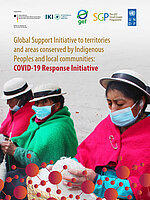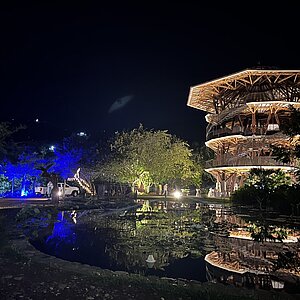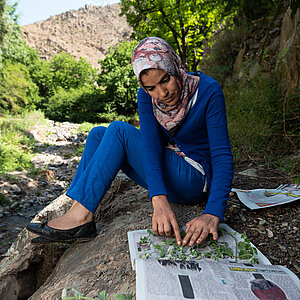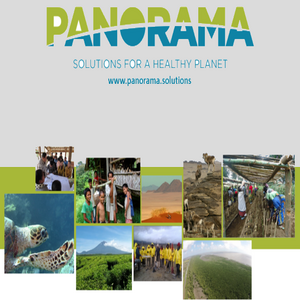Biodiversity is the basis for our existence

The International Day for Biological Diversity is celebrated on 22 May and this year’s event has the theme ‘Building a shared future for all life’.
The title highlights the fact that biodiversity is the basis for all life on Earth – and therefore also a precondition for the survival of the human race.
The Global Assessment Report on Biodiversity and Ecosystem Services published by the Intergovernmental Platform on Biodiversity and Ecosystem Services (IPBES) drew attention to this back in 2019, stating: “A critical turning point has been reached that will dictate our future as a species. Without effective measures to counter the loss of biodiversity, 80 percent of the sustainable development goals (SDGs) and core targets from the Paris Agreement will be unachievable.” The report therefore underlines the importance of linking together biodiversity conservation, climate change mitigation and adaptation to the impacts of climate change.
A healthy natural environment secures supplies of nutrition, fresh water and clean air, forming the basis for sustainable development and having a positive impact on human health: healthy ecosystems act as natural protective barriers, and are therefore able to prevent the emergence and propagation of disease. At the same time, intact ecosystems are the best form of natural climate change mitigation, since they bind carbon dioxide and help with adaptation to the impacts of climate change.
And yet the loss of biodiversity, which includes both the diversity of species as well as genetic diversity within species and the overall spectrum of ecosystems themselves, is proceeding at an alarming rate. The impacts from this negative trend are particularly severe for indigenous and local communities, who often maintain a close bond with the natural world.
The main drivers of this sustained loss of biodiversity are changes in land and ocean usage, the direct exploitation of organisms, climate change, environmental pollution, and invasive, non-native species.
Despite global efforts to counter these drivers, none of the 20 Aichi targets (2011–2020) from the international Convention on Biological Diversity (CBD) have been achieved in their entirety. To prevent the far-reaching consequences of biodiversity loss for human well-being, a fundamental change is required in the relationship between humans and the natural world.
A new roadmap: the Global Biodiversity Framework
The new Post-2020 Global Biodiversity Framework (GBF), which is set to be adopted this year at the 15th Conference of the Parties (COP 15) to the CBD in Kunming, is intended to introduce this transformative change. For many years, the CBD has represented efforts to maintain biodiversity as well as its sustainable usage, and the fair and equitable sharing of benefits from the use of genetic resources. The new framework aims to achieve the vision of living in harmony with nature by 2050.
An initial draft published by the CBD Secretariat lists 21 action-oriented targets. A core target here is to place at least 30 percent of the Earth’s surface – land and sea – under the protection of conservation laws. Other key targets address invasive species, and reducing the input of nutrients, pesticides and plastics into the natural environment. The aim is also to strengthen ecosystem-based approaches, reduce incentives that are harmful for biodiversity and provide additional financing for biodiversity conservation. Alongside ambitious and measurable targets, it is also important to agree an effective implementation strategy for these goals.
IKI supports the global framework and the achievement of biodiversity targets
For many years, the International Climate Initiative (IKI) has funded projects with the aim of supporting the CBD targets. From the outset, the IKI has focused on combining biodiversity and climate change mitigation measures. Since 2008, over EUR 1.3 billion has been provided to support over 300 biodiversity-relevant projects. These projects adopt a wide variety of approaches to maintain, restore or ensure the sustainable use of ecosystems all over the world.
Indigenous and local communities have an important role to play in helping to conserve biodiversity. The IKI project ‘Support for indigenous peoples and community conserved areas and territories (ICCAs)’ provides them with support in their efforts to maintain their ancestral lands. In the course of this main project, up to 600 small-scale projects will be financed in 45 countries, for example. At the same time, the project is also working to ensure the recognition and incorporation of traditional knowledge and usages within governmental planning processes.
Landscape approaches offer solutions to avoid utilisation competition and goal conflicts while enhancing potential synergies. The IKI project ‘Operationalising the landscape approach for biodiversity and benefits: Policy, practice and people’ works to implement the landscape approach in practice and encourage its further use. This is being achieved by the networking of relevant actors, a public relations programme, and cooperation with political decision-makers and other target groups at a national and international level. This will improve the integration of biodiversity with national policies and land development planning.
Globally, several proven approaches are already in place that aim to combine biodiversity conservation with sustainable development. The IKI project PANORAMA: Solutions for Healthy Planet Project is using an online knowledge platform to document and disseminate reproducible solutions. The platform currently offers solutions on a wide range of key topics, including protected areas, ocean and coastal areas, ecosystem-based adaptation, sustainable agriculture, corporate engagement, nature and culture, sustainable urban development, forest landscape restoration, and biodiversity conservation.
We hold the future in our hands
The adoption of a new global biodiversity framework with robust implementation mechanisms at COP 15 will be a milestone achievement that leads by example. In the future, the IKI will continue to pursue its ambitious approaches to the conservation and restoration of biodiversity, thereby contributing to securing this basis for human existence and addressing the many challenges faced by human societies. Long-term engagement on the part of all actors is required, however, to reverse the biodiversity crisis.
The link has been copied to the clipboard
Contact
IKI Office
Zukunft – Umwelt – Gesellschaft (ZUG) gGmbH
Stresemannstraße 69-71
10963 Berlin
Video statement
Related Publications
-

-
 06/ 2021 | Tool/Open source product
06/ 2021 | Tool/Open source productOperationalizing integrated landscape approaches in the tropics
English (external link)










![[Translate to English:]](/fileadmin/_processed_/a/5/csm_20221215_CBDCOP15_2029ff5619.jpg)

![[Translate to English:] Walhai](/legacy/_processed_/d/4/csm_20210608_Walhai_Miguel_Schmitter_0106af1a48.jpg)



